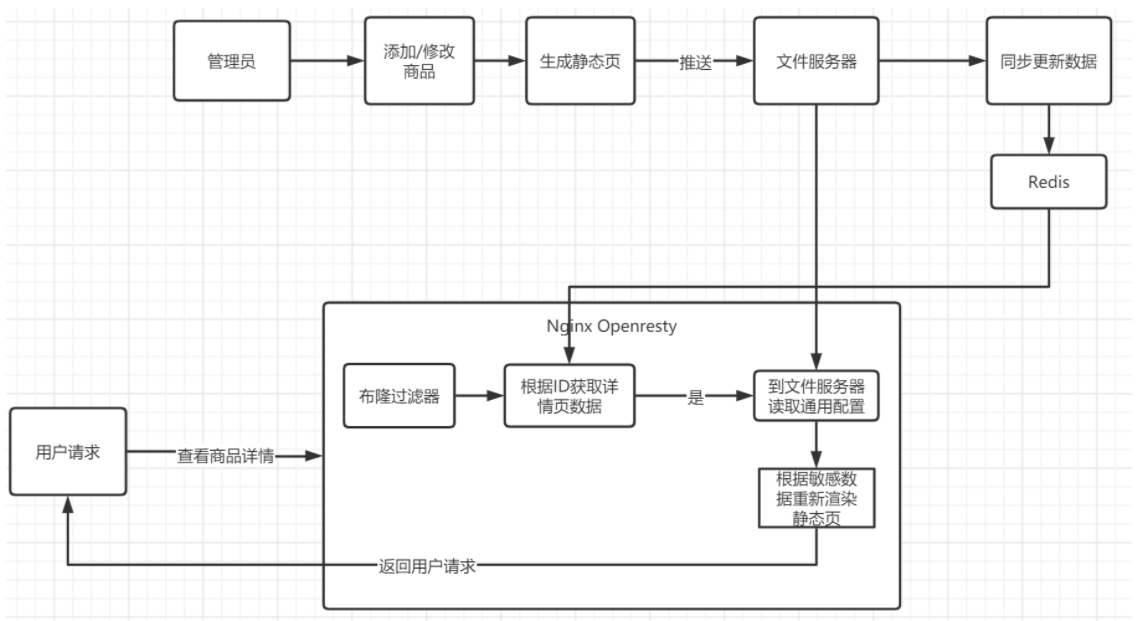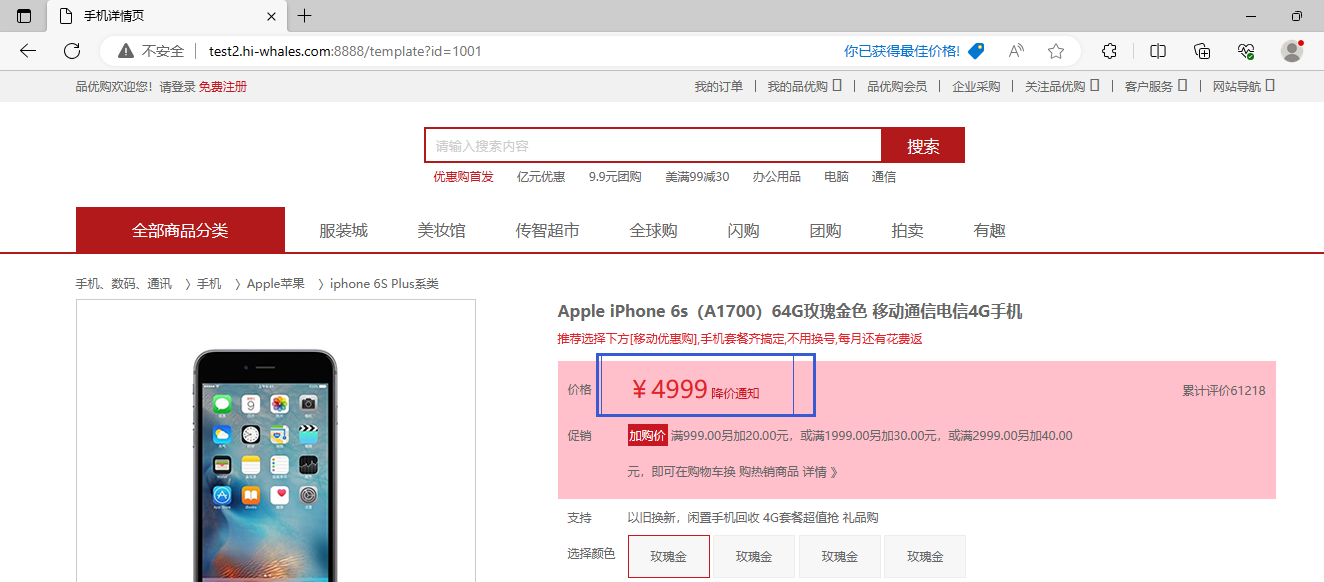第四节:千万级流量下商品详情页的全套方案和压测分析
一. 整体业务再次分析
流程如下:


管理员-详细分析:
1. 管理员在后台,增加和修改商品,利用Thymeleaf 来生成一个静态页面,并将该页面上传到文件服务器上。
PS:这个地方生成的是一个通用的静态页,敏感数据比如 价格,商品名称等,通过占位符来替换。
2. 将敏感数据同步到redis中,如下:
(1). 先创建一个布隆过滤器 【BF.RESERVE bf_taxi 0.01 10000 NONSCALING】 , 仅此一次
(2). 将商品的主键编号(比如:1001),添加到该布隆过滤器中 【BF.ADD bf_taxi 1001】
(3). 利用redis的hash结构,存储商品的敏感信息
A. hashId : hkey_商品主键编号, 比如 hey_1001
B. key-value键值对: url 对应需要抓取的页面的地址 http://8.130.72.40/index.html; amount 对应该商品的价格 4999
【hset hkey_1001 url http://8.130.72.40/index.html amount 4999】
(4). 后续如果只修改价格,那么只需要修改redis中的敏感数据即可。
用户请求-详细分析:
1. 从请求的url (如:http://test2.hi-whales.com:8888/template?id=1002)中获取商品主键编号 1002
2. 检验该reqId是否为空,如果为空,直接返回。
3. 校验布隆过滤器中是否存在该reqId,如果不存在,则是非法请求,直接返回。
4. 拼接得到hash结构中 hashId,即 hkey_1001
5. 根据该hashId,获取对应的所有key-value集合,判断是否存在key-value集合,不存在,直接返回; 再判断是否存在amount数据,不存在直接返回
6. 根据reqId先在本地缓存中获取模板内容,如果本地缓存中没有,则根据redis中的url去远程抓取,抓取失败,则直接返回;如果抓取成功,则往本地缓存中存一份。
7. 根据模板引擎,渲染模板中的敏感数据,返回页面。
二. 实操
1. 封装 requestTemplateRendering.lua 文件
用来抓取网页文件,放到openresty安装目录下的script文件夹中。(其中:openresty/lualib/resty/目录下新增的库有:http.lua,http_headers.lua 、template.lua、html.lua、microbenchmark.lua、rediscluster.lua,xmodem.lua)前一节详细讲过了
查看代码
local template = require("resty.template")
local lrredis = require("redisUtils")
local lgethtml = require("requestHtml")
local lreqparm = require("requestUtils")
--获取请求参数
local reqParams = lreqparm.getRequestParam()
-- 定义本地缓存
local html_template_cache = ngx.shared.html_template_cache
-- 获取请求ID的参数
local reqId = reqParams["id"];
ngx.log(ngx.INFO, "requestID:", reqId);
-- 校验参数
if reqId==nil then
ngx.say("缺少ID参数");
return
end
-- 布隆过滤器检查id是否存在
local bfexist = lrredis.bfexists("bf_taxi",reqId)
ngx.log(ngx.INFO, "布隆过滤器检验:", bfexist)
-- 校验key不存在直接返回
if bfexist==0 then
ngx.say("布隆过滤器校验key不存在...")
return
end
-- 拼接hget的key
local hgetkey = "hkey_".. reqId
-- 通过hget获取map的所有数据
local templateData = lrredis.hgetall(hgetkey);
if next(templateData) == nil then
ngx.say("redis没有存储数据...")
return
end
--获取模板价格数据
local amount = templateData["amount"]
ngx.log(ngx.INFO, "amount:", amount)
if amount == nil then
ngx.say("价格数据未配置");
return
end
-- 获取本地缓存对象
ngx.log(ngx.INFO, "开始从缓存中获取模板数据----")
local html_template = html_template_cache:get(reqId)
-- 判断本地缓存是否存在
if html_template == nil then
-- 获取模板url中的数据
ngx.log(ngx.INFO, "缓存中不存在数据开始远程获取模板")
local url = templateData["url"]
ngx.log(ngx.INFO, "从缓存中获取的url地址:", url)
if url == nil then
ngx.say("URL路径未配置");
return
end
-- 抓取远程url的html
ngx.log(ngx.INFO, "开始抓取模板数据:", url)
local returnResult = lgethtml.gethtml(url);
-- 判断抓取模板是否正常
if returnResult==nil then
ngx.say("抓取URL失败...");
return
end
-- 判断html状态
if returnResult.status==200 then
html_template = returnResult.body
--设置模板缓存为一小时
ngx.log(ngx.INFO, "将模板数据加入到本地缓存")
html_template_cache:set(reqId,html_template,60 * 60)
end
end
ngx.log(ngx.INFO, "缓存中获取模板数据结束----")
-- 模板渲染
--编译得到一个lua函数
local func = template.compile(html_template)
local context = {amount=amount}
ngx.log(ngx.INFO, "开始渲染模板数据")
--执行函数,得到渲染之后的内容
local content = func(context)
--通过ngx API输出
ngx.say(content)
2. 配置nginx
(1). 配置本地缓存
# 配置模板缓存
lua_shared_dict html_template_cache 10m;
(2). 配置server
# 6. 千万流量的全套方案
server {
listen 8888;
charset utf-8;
server_name test2.hi-whales.com;
# 配置路径重写
location ~* \.(gif|jpg|jpeg|png|css|js|ico)$ {
rewrite ^/(.*) http://test1.hi-whales.com/$1 permanent;
}
# 配置获取网页
location /template {
default_type text/html;
content_by_lua_file /root/mydevelop/openresty/script/requestTemplateRendering.lua;
# content_by_lua ' ngx.say("<p>hhhhh") ';
}
#删除本地缓存
location /delete {
default_type text/html;
content_by_lua '
local lreqparm = require("requestUtils")
--获取请求参数
local reqParams = lreqparm.getRequestParam()
-- 定义本地缓存
local html_template_cache = ngx.shared.html_template_cache
-- 获取请求ID的参数
local reqId = reqParams["id"];
ngx.log(ngx.INFO, "requestID:", reqId);
-- 校验参数
if reqId==nil then
ngx.say("缺少ID参数");
return
end
-- 获取本地缓存对象
html_template_cache:delete(reqId);
ngx.say("清除缓存成功");
';
}
}
3.初始化数据
(ps: 8.130.72.40 为nginx所在服务ip的地址,用来代理两个静态资源服务器,这里不要写域名,写ip地址,否则抓取的时候,会报错无法解析域名)
#连接redis
redis-cli -c -h 127.0.0.1 -p 6380 -a 123456
# 在redis中添加一个布隆过滤器 错误率是0.01 数量是1万个
BF.RESERVE bf_taxi 0.01 10000 NONSCALING
# 在bf_test 的布隆过滤器添加一个key
BF.ADD bf_taxi 1001
#检查数据是否存在
BF.EXISTS bf_taxi 1001
# 添加URL以及价格
hset hkey_1001 url http://8.130.72.40/index.html amount 4999
4. 访问
http://test2.hi-whales.com:8888/template?id=1001 ,如下图,大功告成

访问:http://test2.hi-whales.com:8888/template?id=1002

三. 压测
改造后 和 改造前对比

!
- 作 者 : Yaopengfei(姚鹏飞)
- 博客地址 : http://www.cnblogs.com/yaopengfei/
- 声 明1 : 如有错误,欢迎讨论,请勿谩骂^_^。
- 声 明2 : 原创博客请在转载时保留原文链接或在文章开头加上本人博客地址,否则保留追究法律责任的权利。


 浙公网安备 33010602011771号
浙公网安备 33010602011771号